The Bourbon Trail, college football stadiums, Northern Lights: One Raleigh woman’s race against time
The idea came to Whitford Wooten during a trip last summer along the Bourbon Trail in Kentucky, living out one of her father’s dying wishes. He always wanted to go to Louisville, himself, and visit the distilleries, but then the disease progressed too quickly. That was one of the cruelest things about ALS: It didn’t come with a timer.
That was one of the things Wooten learned then and what she especially knew now. She’d only recently entered into her 30s, an early-education teacher and a high school field hockey coach in Raleigh, and there’d been a whole life ahead of her, filled with plans and goals and distant dreams. And now there was no way to know how many good years or months or weeks remained.
No way to know when the disease would steal the ability to walk or talk or even breathe. Her dad, Robert Wooten, made a list when he was diagnosed. Kentucky was on it. He couldn’t have known that he only had 11 months; that time would run out sooner than anyone could have imagined.
“He got sick too quickly,” said his wife, Elizabeth, and that was part of why she and Whitford found themselves in Kentucky last summer, six years after Robert’s death in 2017. Part of the trip was about honoring his memory. But then there was this: Whitford had just received the dreadful news: She, too, had ALS, and who knows how much time.
So “that was the first thing we did,” Elizabeth said, of planning to visit the Bourbon Trail. “We were like, ‘Well, OK — let’s go do this, since Dad didn’t get to it.”
And so they went, and it was there in Louisville one night when another idea was born. On their way to dinner, Whitford and her mom rode past the Louisville Cardinals’ football stadium.
It was a summer night and quiet, but even an empty stadium can emit a certain kind of energy. Six or seven Saturdays a year, college football stadiums across the country come alive, teeming with humanity and drama. There are the teams vying for the same thing, a victory, but also the bands blaring flight songs and tens of thousands of spectators coming together, sharing joy or misery.
In that way stadiums are special places, and upon seeing Louisville’s, Whitford couldn’t help but think of her dad. How, when she was growing up in Kinston, they’d watch college football together. And so the thought came to her, almost on a whim: “You know,” she told her mom, “it would be really cool to go see all the stadiums.”
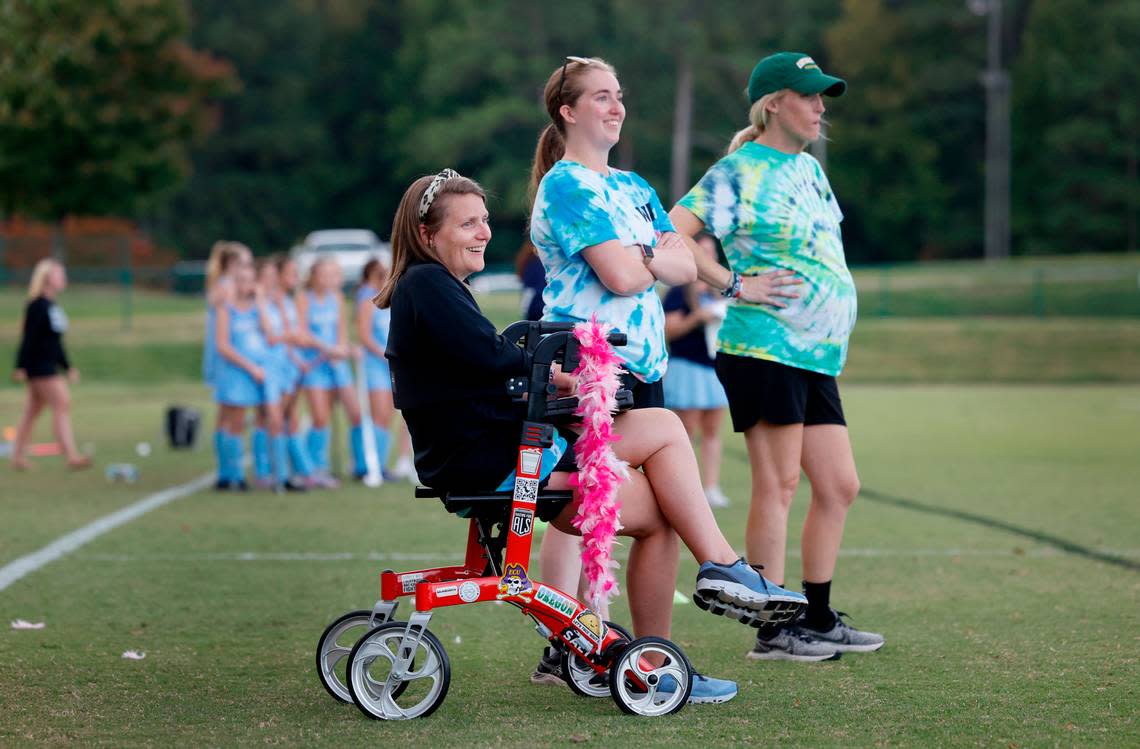
‘If you can’t laugh, then what can you do?’
Whitford Wooten is 31, with sandy brown hair and kind eyes and a smile that’s too resilient for her circumstances. She’s a preschool teacher and an assistant field hockey coach at Ravenscroft High and when her father was diagnosed with ALS, back in 2016, she and her younger sister underwent genetic testing to see if they could get it, too.
The test came back negative. There was no cause for alarm. At least not until Whitford began experiencing nerve pain in her right leg in the summer of 2021 or when, the next spring, other symptoms began manifesting: numbness in her leg and foot drop and weakness in one of her arms and the symptoms persisted and ever slowly progressed.
She underwent evaluations for MS. For Parkinson’s. It wasn’t either.
The whole time she thought, “I just can’t get ALS,” because that’s what the testing told her. What she didn’t know, at first, was that researchers had identified new genetic markers for the disease over the past six years; that testing negative before didn’t provide guarantees now. And then came the diagnosis, in July, and the confirmation after she visited Wake Forest’s ALS clinic in October.
“The Lord has a funny sense of humor, I guess,” Whitford said, and somehow she’d managed to keep her own, though sometimes her friends and family had to tell her that maybe “it’s a little too dark.” That was one of the ways she managed, though. By joking about it. By laughing about it, because who could be sure when the laughter might be stolen, too?
And so she changed her Facebook picture to one of her with a big smile, in a green shirt that said, in the style of a Yelp review: “ALS ... would not recommend,” with one out of five stars highlighted. She covered her walker, which she began using in September, with colorful stickers, including one that said, “surely not everybody was kung fu fighting” and another, of a fan, that said, “this blows.”
“I think you have to find joy and laugh in the face of darkness,” she said one day in October, after she carefully made her way into a coffee shop near her school. “Because, you know, what else is left? ... If you can’t laugh, then what can you do?”
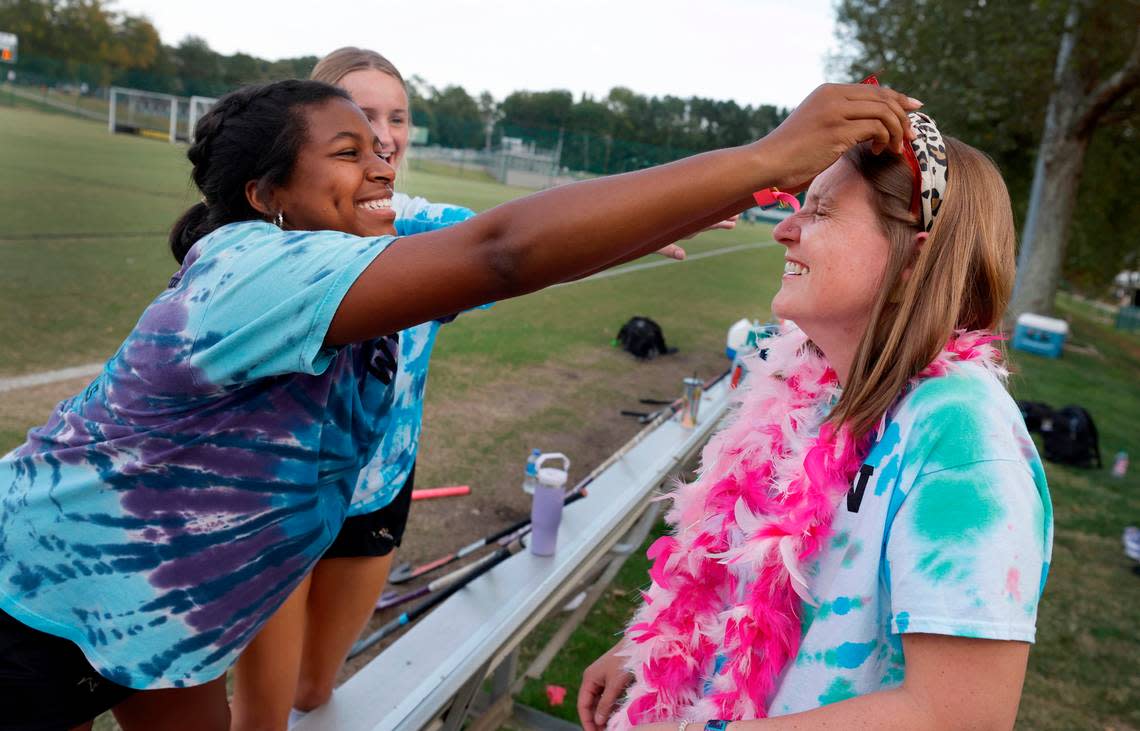
‘Stick it to ALS’
The next night, a Tuesday, was senior night for the Ravenscroft field hockey team. Whitford grew up playing it in Kinston; she made the varsity team at her school when she was in seventh grade. Knee injuries denied her the chance to play in college, like she’d planned, but she remained connected to the sport, and became an assistant at Ravenscroft three years ago.
During her first two seasons she remained a whirlwind of energy. She played with the girls in practices. She bounded up and down the sideline, offering encouragement and support.
“And this season, I can’t do any of that,” she said. “And so for me that I think that’s the one time I get frustrated. Because I love this sport, beyond words.”
The season began with Whitford introducing the players to her walker, which doubles as a seat. If she stood for too long, she began to notice the effects the next day. She feared the walker might become “a barrier” with her players, she said, but it never was. Sometimes one would come up and take a seat if she wasn’t using it. If anything, it became a symbol of perseverance, a reminder that she wasn’t going to be stopped. She was going to be there for her team, and her team for her.
At the last home game, the seniors walked out onto the field when their names were called. An announcer listed their plans and hopes for the future; where they were going to college and what they aspired to be. Just about everyone could relate to youthful dreams, but Whitford knew what it was like to have to condense them into an indeterminate amount of time; to prioritize the things she wanted to do and see while she still could.
At the end of the ceremony the team recognized her, an announcement going out over the speakers.
“Tonight we’d like to dedicate this game to our coach ... Coach Wooten’s positive attitude, humor and knowledge of the game has been vital to our success this season and only proves further how strong of a person and coach she truly is ... Tonight we dedicate this game to you, and the seniors, and the fight against ALS. We love you.”
Whitford’s mom was there, holding back tears, and so was her sister, Carrington. One of the girls gave Whitford a bouquet of flowers. Everyone was wearing shirts with her initials on the front and on the back it said “STICK IT TO ALS” beneath a pair of field hockey sticks crossed together. There was a big group hug, some long embraces and not many dry eyes.
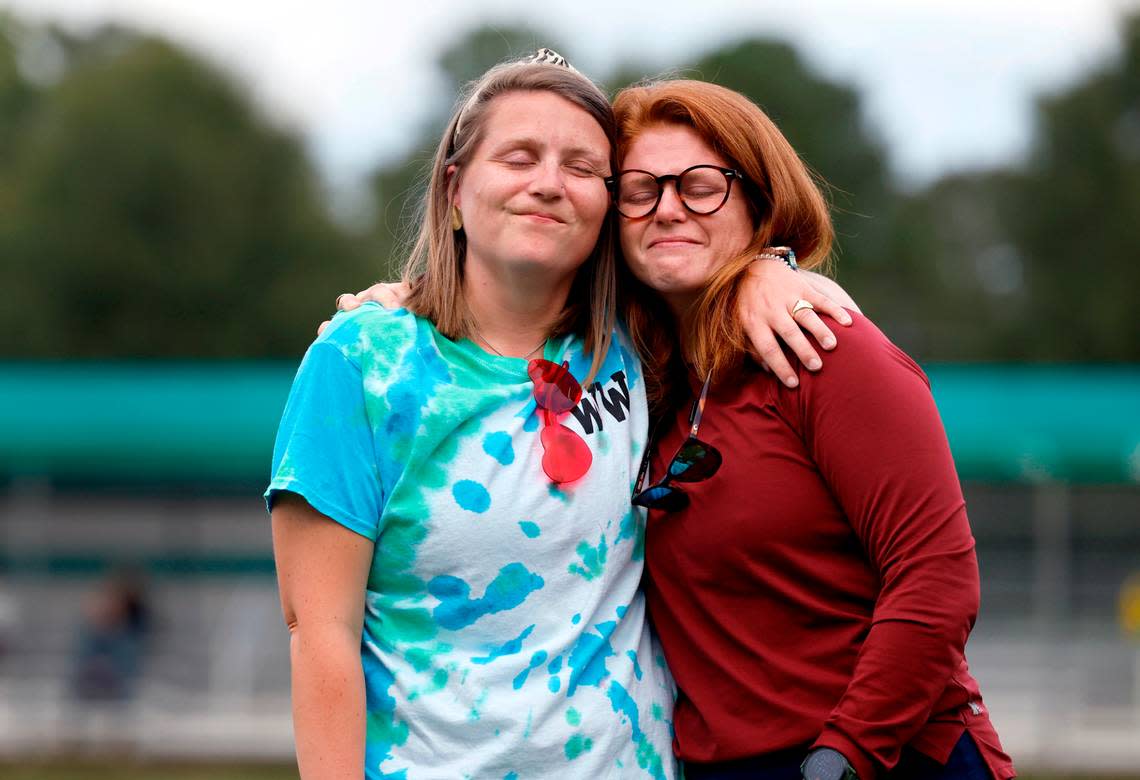
Football, and faith
If you knew you didn’t have much time, how would you spend it? What would you want to see? Where would you want to go? How would you want to make the most of what you had left, not knowing when it’d end but knowing the end was coming much sooner than you ever thought?
A couple of things quickly moved to the top of Whitford’s list: She wanted to see the Northern Lights. And she wanted to visit every ACC and SEC football stadium, or at least as many as time allowed. The why of it became something she pondered.
Part of it was obvious enough: “I think just because I love football so much,” she said, and watching games always brought her closer to the memory of her dad, to those Saturday nights they’d spend together, casually taking in the game of the week over a pizza.
But then there was another part of it, too: “When I was diagnosed, I wasn’t mad, I wasn’t upset, I wasn’t really angry,” she said. “I was thinking, OK, how can I impact the most amount of people and glorify God by doing it. And I think making such a big goal will attract people’s attention.
“And if I can do that, and also glorify Him in the process, I think that’s a win-win.”
She wanted to share her story, in part, because she believed any bit of awareness helped. ALS remains incurable. Little is understood about its cause or how to treat it and funding for research is always a constant battle. The ALS Association released a statement earlier this month in which it said it was “deeply concerned and disappointed” in the level of projected government funding.
“ALS research needs to be funded and increased — NOW,” the organization said. “People living with ALS cannot wait.”
It was true, in the most literal way. In July and August, Whitford began mapping out a plan to visit as many stadiums as she could. As it turned out, a neighbor of hers had a connection with a former faculty athletics representative at Florida State, and soon Whiford’s story was being relayed throughout the ACC, showing up in inboxes of faculty athletic reps across the conference.
“Friends,” the email began, “… I have a very sad situation on my hands and I’m hoping you can help me. There is a young woman … recently diagnosed with ALS … she would like to tour all the SEC and ACC football stadiums before her illness gets too bad … thank you in advance for considering this. Such a tragedy.”
And soon enough, offers came back to Whitford, invitations to tour stadiums; some schools inviting her out for a game. Lissa Broome, a law school professor and the faculty athletics representative at UNC, facilitated Whitford’s visit there, in August. For someone who grew up an N.C. State fan, who attended State for a while before transferring to ECU, Whitford was “skeptical,” she said with a laugh, of setting foot in Kenan Stadium.
But then “it was great,” she said, and “absolutely wonderful” to receive the VIP tour of the stadium and the offices and behind-the-scenes facilities. Whitford’s weekends began filling up. There was a visit to N.C. State’s Carter-Finley Stadium, where she walked out of the Wolfpack’s home tunnel, and a trip to ECU, where she hobnobbed with Pirates coach Mike Houston.
She went to a game at South Carolina when the Gamecocks hosted Mississippi State on Sept. 23, and she spent most of it marveling at the size of the place; the noise of an SEC game day. Among the other 80,000 or so people in Williams-Brice Stadium that day there was, undoubtedly, some discontented grumbling. Some jeering of the refs or booing of a play call; a number of people, a large number, probably, taking a game among college kids a little too seriously.
And then there was Whitford, absorbing the spectacle of it all. Crossing another stadium off the list.
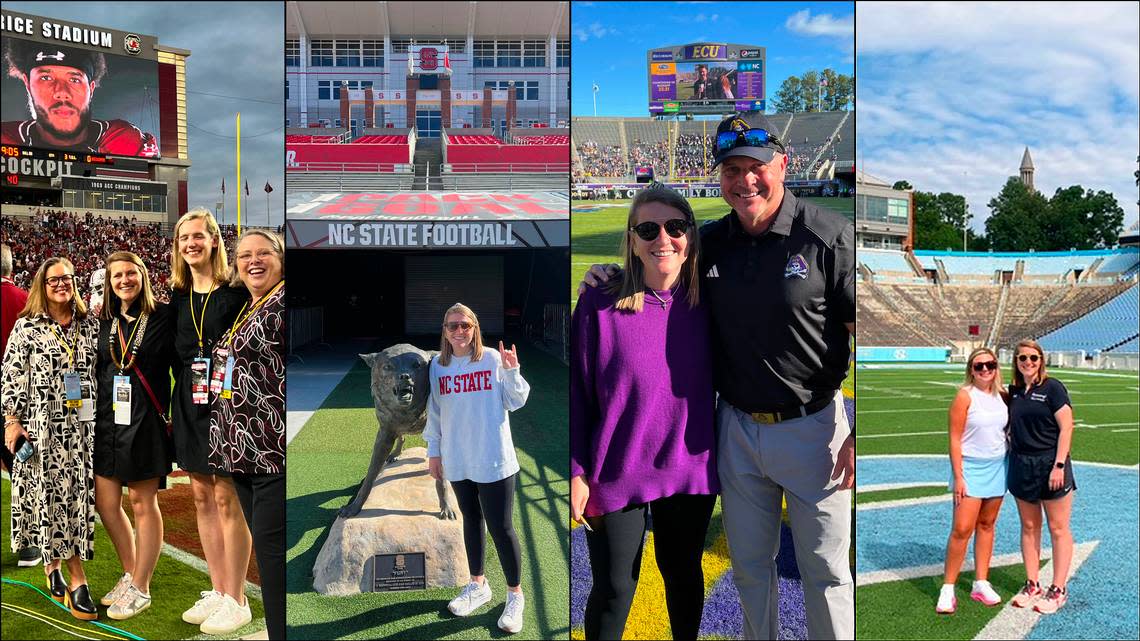
Some of her plans fell through. A trip to Texas A&M scheduled for late October never materialized, because flying was becoming more of an ordeal now that it was more difficult to breathe. The days were taking their toll, new challenges arising all the time, plans needing to be scrapped. Life became about managing the illness, about making the most of a day or an hour.
She decided not to sit in a car for 13 hours on the way to LSU. At the last second she decided to get off a plane bound for Colorado, for a trip she and her sister planned. That was toward the end of October, with breathing becoming more and more difficult. Soon she learned she couldn’t fly at all.
“It’s progressing a lot faster than we would like, and I would like,” she said earlier this month. “It is what it is. But yeah, no more big trips for me, I don’t think.”
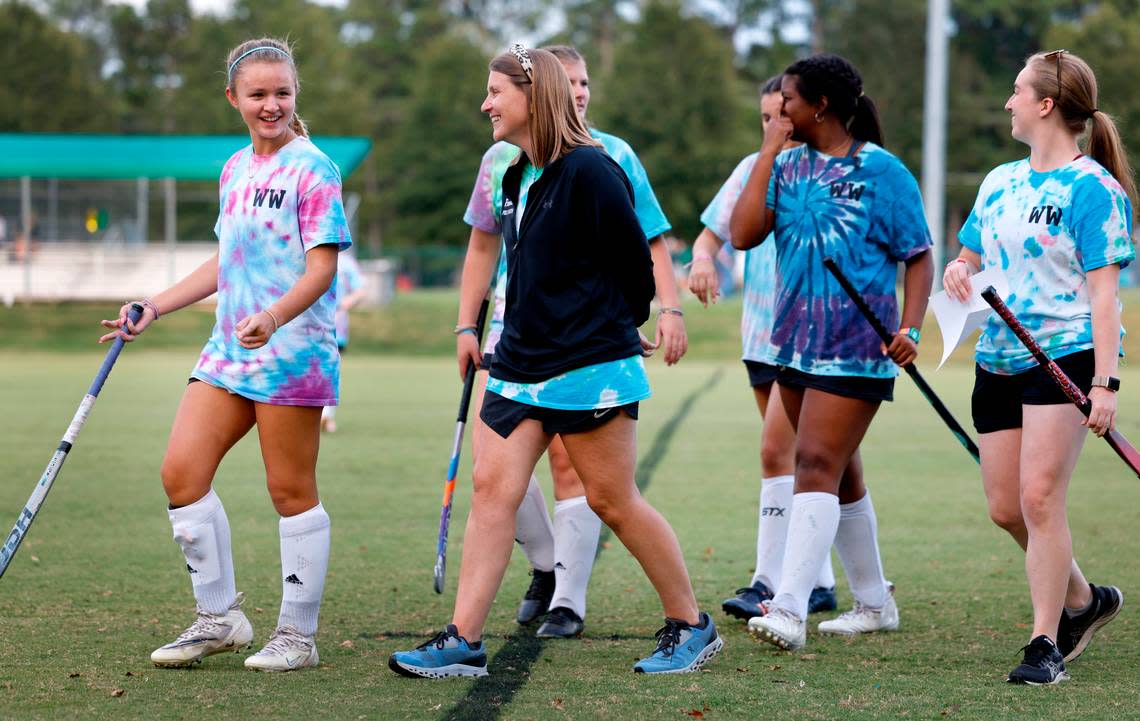
‘You just ... enjoy’
Well, maybe a couple more. This week Whitford planned to gather in Buies Creek with family. The same Thanksgiving gathering they’ve done every year since her dad passed away. The plan is to drive to Georgia, to Athens, on Thursday. The Bulldogs end the regular season at Georgia Tech Saturday night, but a tour awaits Whitford in Athens on Friday.
Her mom isn’t the biggest college football fan, “but I love Athens, Georgia,” Elizabeth said. And so she’s anticipating this one, too. Last week, she was waiting on the delivery of a hospital bed, just to make things more comfortable at home for Whitford. She’s still working, with her mom driving her to school every morning, and with Whitford cracking dry jokes when she can.
“She’s got really dark humor,” Elizabeth said, and she’d been through her own kind of hell, with ALS taking her husband and now progressing on her daughter. But she knew her own fight didn’t compare to what Whitford was enduring, and yet “she literally has such joy, and such a positive attitude.”
“Who wants to be 31 years old and having their mom drive them to work?” she asked. “And who wants to be living with their mom at 31?”
And now Whitford had a portable machine to help her breathing. She needed a wheelchair and still, she’d climb out of the car and into it and turn to her mom with a cheery voice every morning and say, “Have a great day!”
“And all I could think of,” when this happened on a recent morning, Elizabeth said, “was she just expended more energy than I will expend for the whole entire day, just to get to school.
“And she hasn’t complained yet.”
After Georgia this weekend, there’d been plans for other stadium visits, including one to Florida State in January. But no one could be sure if it’d be possible. The Northern Lights moved to No. 1 on the list, and Whitford’s mom and sister and some of her friends hoped to rent a van and make the trip up to Acadia National Park, in Maine, in January.
The lights would be visible then, at the darkest time of night. They’d be worth the journey.
They’d offer a different kind of beauty than a college football game, or stadium. And a lot more peace, anyway. When Whitford thought back to the places she’d been the past few months, she felt a sense of “gratitude, and humbling,” she said.
“And I feel like ALS puts everything into perspective. But at the same time, it doesn’t, if that makes any sense at all. You become more grateful, which is so cliche, but you just ... enjoy.”
And she shared a story about a recent dinner with some friends. Nothing too fancy. Just friends sitting around a table, catching up, and it was then, especially, Whitford said, that something struck her, a deeper sense of thankfulness.
She felt grateful, amid everything that suggested she shouldn’t be, because she had this moment. She didn’t know what might come, or when, but she had here and now.
